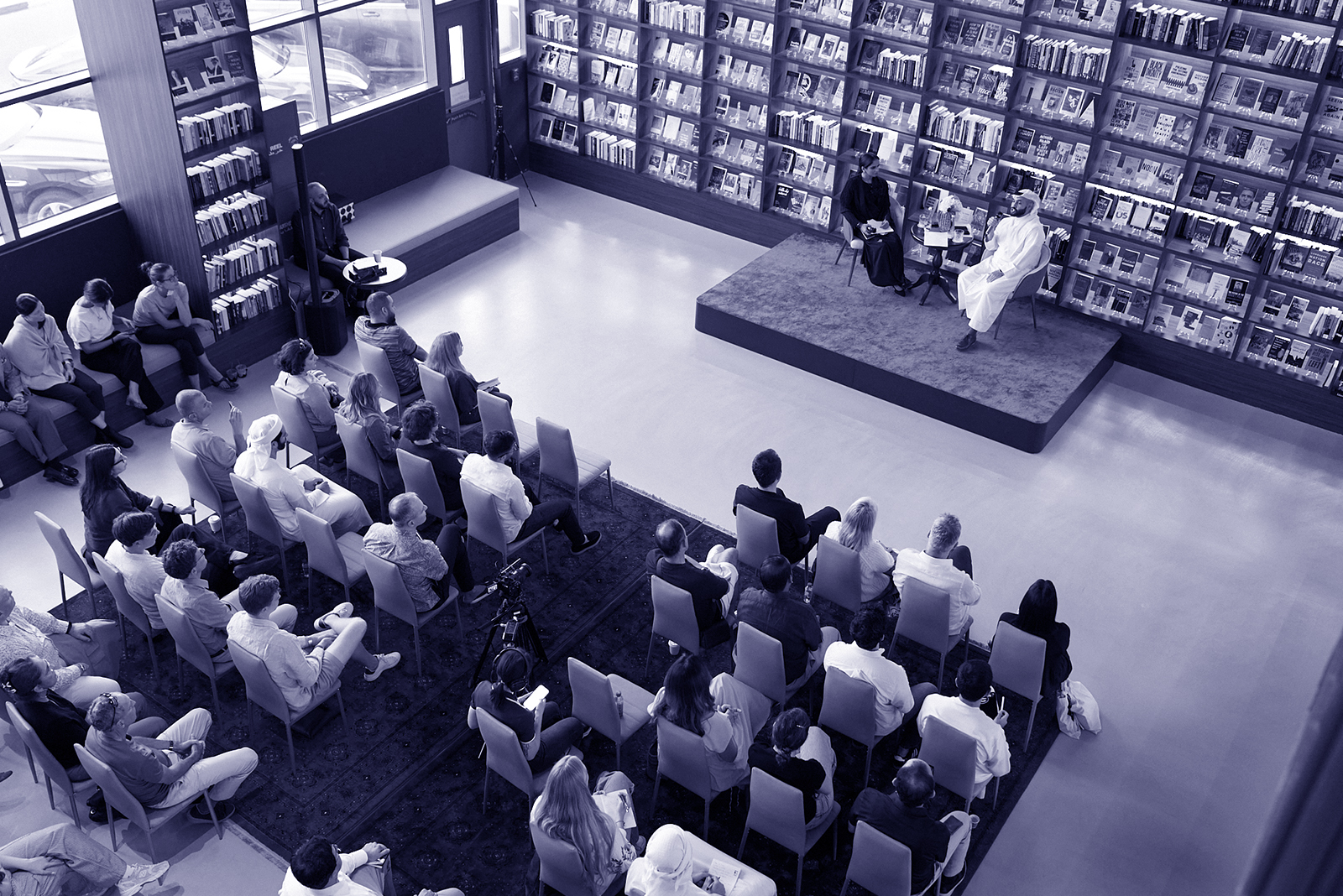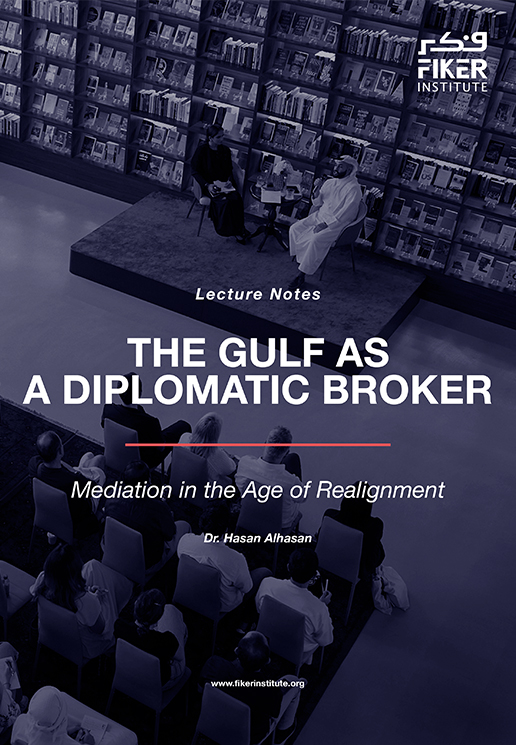
The Gulf as Diplomatic Broker: Mediation in the Age of Realignment
For the inaugural lecture of the Al-Khaleej program, Fiker Institute hosted Dr. Hasan Alhasan, Senior Fellow for Middle East Policy at the International Institute for Strategic Studies to discuss the role of Gulf states as diplomatic brokers.
WHY IS THE GULF INTERESTED IN MEDIATION?
In his opening remarks Dr. Alhasan contextualized the emergence of Gulf mediation in the current moment of global realignment which is shifting away from the United States (US)-led order. Arguing that the Gulf states’ engagement in peacemaking is part of a strategic calculation, he outlined five reasons for their engagement in mediation efforts. Firstly, regional security is important for Gulf states’ business, investments, and supply chains, and it is crucial for their image of stability in a region dogged by insecurity. Secondly, mediation makes Gulf states useful to the Great Powers, for example Qatar’s facilitation of talks between the US and the Taliban or Saudi Arabia’s hosting of backchannel discussions between Russia and Ukraine. Thirdly, mediation offers prestige and the opportunity for Gulf states to project an image of statesmanship. Fourthly, these efforts serve domestic and regional purposes; in societies that share religious, linguistic, and family ties to the wider region, mediation signals an effort by governments to alleviate suffering in their near abroad. Moreover, to the wider world, it projects an image as responsible stewards of peace and regional security. Finally, mediation is a form of power, enabling the mediator to set the agenda, shape narratives, and potentially attempt to influence outcomes.
WHAT ARE THE RISKS OF MEDIATION?
Mediation efforts can fail – and often do – and can cause reputational damage to the states leading them. There is also the risk of retaliation. Dr. Alhasan referenced Israel’s strikes on Hamas leaders in Doha to illustrate the dangerous illusion that mediation offers immunity. There is also the risk that successful mediation can end a war but may ultimately cement the conditions for future dysfunction. Finally, mediators risk going unrecognized, illustrating how much of the work of diplomacy remains invisible and without accolades.
ARE THERE DISTINCTIVE CHARACTERISTICS OF GULF MEDIATION?
Dr. Alhasan highlighted several approaches that set Gulf states apart. Firstly, Gulf states are often more pragmatic and less engaged in using conflict mediation to push for preconceived normative notions of good governance. Secondly, the ability to navigate interpersonal diplomacy through long-standing relationships is an important feature of Gulf mediation.
HOW ARE GULF STATES NAVIGATING THE CURRENT SHIFT IN GLOBAL POWER?
Dr. Alhasan contended that the Gulf states are not merely mediating regional conflict, but the current global realignment itself, positioning themselves as beneficiaries of the new world order. Gulf states offer access in a world polarized by Great Power competition and economic fragmentation. Their geopolitical neutrality allows them to deal with China, the US, Russia, India, and others in a form of arbitrage, rather than exclusively peacemaking. Moreover, Gulf states have made themselves central to physical connectivity on a global scale, investing not only in oil and gas, but in logistics, renewable energy infrastructure and trade corridors. On trade, Gulf states have pursued trade liberalization, not as an ideological commitment, but as a tool to anchor themselves into global supply chains. Dr. Alhasan described the current moment in Gulf mediation not as a resurgence of diplomacy per se, but a reshuffling of power.
He further characterized Gulf states’ strategy as one of multi-alignment. Rather than pursuing non-alignment, they are adopting an interest-based, issue-by-issue approach and avoiding wholescale alignment with any of the Great Powers. Pointing out the importance of the US as the Gulf states’ primary defense and security partner, the role of Russia in co-managing global oil markets through OPEC+, and China as the Gulf largest trading partner, he argued that the Gulf states’ strategy entails neutrality in the Great Power rivalry but multi-alignment on various other policy issues. He further highlighted that this approach is in line with the directions other middle powers have pursued in navigating the emerging world order.
HOW DOES THE GULF VIEW BRICS?
Dr. Alhasan called for a reading of Gulf states’ engagement with BRICS through the lens of their growing interest in global economic governance, rather than merely as a tool of hedging and foreign policy diversification. He discussed Gulf states’ growing role at the World Bank and the International Monetary Fund (IMF), arguing that they have become essential enablers and force multipliers of IMF programs, particularly in the Middle East and North Africa. Notably, Gulf states have been important co-financers of IMF interventions in Egypt and Pakistan and are playing an increasingly important role in the discussion on global debt sustainability.
HOW HAVE GULF STATES’ RELATIONS WITH CHINA AND EUROPE EVOLVED?
Dr. Alhasan contended that China is more interested in maintaining positive relations with regional powers, protecting its economic interests, and working through its partners than having a robust strategic presence in the Middle East. As for Europe, while there have been areas of friction between the blocs for decades, the past two years have seen an immense growth in Gulf Cooperation Council (GCC)-EU engagements. Moreover, the role of Iran in the Russia-Ukraine theater has highlighted the interconnectedness between Russia and Iran, creating a growing convergence in threat perceptions. The EU and GCC have also grown closer on economic and energy issues, with the Gulf states investing heavily in renewable energy connectivity in the Eastern Mediterranean.
HOW HAVE GULF STATES’ SECURITY RELATIONS WITH THE US EVOLVED?
Dr. Alhasan pointed to long-standing frustration with US policy in the Gulf, which was further entrenched by the Israeli attacks on Doha. He qualified Israel’s strikes as qualitatively different, having been carried out by a US ally rather than a shared adversary of the Gulf states and the US, like Iran or the Houthis, and estimated that they could prompt a deeper rethinking of the Gulf states’ security relationship with the US. Rather than replicating the model of US-GCC defense partnerships with other actors, he argued that the Gulf states have built substantive military capabilities of their own. He contended that the elements to create a regionally led security order are present and that the Gulf states have demonstrated significant diplomatic accomplishments in recent years by ending the rift with Qatar, improving relations with Türkiye, normalizing relations with Iran, and with the effort on the part of some Gulf states to create a relationship with Israel.
WHAT ROLE DOES THE GCC PLAY IN INSTITUTIONALIZING REGIONAL COOPERATION?
Citing the existence of the GCC’s collective security clause, its provisions for a unified command, and the Peninsula Shield Force, Dr. Alhasan argued that it remains to be seen how these mechanisms can or will be mobilized in the near to medium term. The broad defense and security architecture in the Gulf remains a hub and spoke system with the US at the center, as exemplified by the reliance on the US for air and missile defense. He argued that the lack of wider intra-regional trust is limiting true and effective defense and security cooperation.
Speaking to the GCC’s broader geopolitical and geoeconomic role, he contended that the GCC institutionally has taken a backseat on issues of security and foreign policy and that trade barriers have hindered more significant economic integration. At the same time, however, the GCC has witnessed a revitalization of collective trade bargaining and is currently negotiating several Free Trade Agreements simultaneously. Making the case for rethinking the expectations of the GCC as an institution, he argued that the GCC has modeled itself implicitly on the EU: progressing towards a customs union and ultimately a common market with a common currency. Instead, the GCC might be closer to the Association of Southeast Asian Nations (ASEAN), a forum to manage intra-bloc relations. He posited that the true potential of the GCC might be as problem-solving mechanism among GCC states, rather than in achieving full defense and security integration.
WHAT ARE THE POSSIBILITIES FOR WIDER ARAB MULTILATERAL COOPERATION?
Dr. Alhasan argued that institutions like the Arab League today lack the tools to enforce collective decision-making. Moreover, weighing whether the dual threats from Israel and Iran could catalyze more serious regional collective security arrangements, such as reported Egyptian proposals for as NATO-style Arab defense alliance, he argued that important bilateral tensions across the region continue to hinder efforts for formal defense integration.
WHAT DOES THE FUTURE OF GULF MEDIATION LOOK LIKE?
Dr. Alhasan posited that Gulf mediation is likely to increase in importance, if only because few other actors are willing to invest the diplomatic and financial capital required. He argued that Gulf mediation, coming from a place of necessity, must be more coordinated and more effective going forward to bring about regional de-escalation and conflict resolution.
The statements made and views expressed are solely the responsibility of the speaker, and do not represent Fiker Institute.
